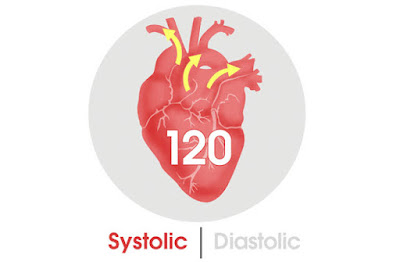What is blood pressure?
Blood pressure is the pressure of blood pushing against the walls of your arteries. Arteries carry blood from your heart to other parts of your body. Your blood pressure normally rises and falls throughout the day. It also increases during exercise or during house work.
What do blood pressure numbers mean?
Blood pressure is measured using two numbers: the first number, called systolic blood pressure, measures the pressure in your arteries when your heart beats.
The second number, called diastolic blood pressure, measures the pressure in your arteries when your heart rests between beats. If the measurement reads 120 systolic and 80 diastolic, you would say, “120 over 80,” or write, “120/80 mmHg.”
HIGH BLOOD PRESSURE
High blood pressure (hypertension) is a common condition in which the long-term force of the blood against your artery walls is high enough that it may eventually cause health problems, such as heart disease.
Blood pressure is determined both by the amount of blood your heart pumps and the amount of resistance to blood flow in your arteries. The more blood your heart pumps and the narrower your arteries, the higher your blood pressure. A blood pressure reading is given in millimeters of mercury (mm Hg). It has two numbers.
There are two main types of high blood pressure: primary and secondary high blood pressure.
- Primary, or essential, high blood pressure is the most common type of high blood pressure.
- Secondary high blood pressure is caused by another medical condition or use of certain medicines.
What are the signs and symptoms of high blood pressure?
High blood pressure usually has no warning signs or symptoms, and many people do not know they have it. Measuring your blood pressure is the only way to know whether you have high blood pressure.
What causes high blood pressure?
High blood pressure usually develops over time. It can happen because of unhealthy lifestyle choices, such as not getting enough regular physical activity. Certain health conditions, such as diabetes and having obesity, can also increase the risk for developing high blood pressure. High blood pressure can also happen during pregnancy
What problems does high blood pressure cause?
High blood pressure can damage your health in many ways. It can seriously hurt important organs like your heart, brain, kidneys, and eyes. The good news is that, in most cases, you can manage your blood pressure to lower your risk for serious health problems.
What can I do to prevent or manage high blood pressure?
Many people with high blood pressure can lower their blood pressure into a healthy range or keep their numbers in a healthy range by making lifestyle changes. Talk with your health care team about
- Make at sure you get at least 150 minutes of physical activity each week (about 30 minutes a day, 5 days a week)
- Not smoking
- Eating a healthy diet, including limiting sodium (salt) and alcohol
- Keeping a healthy weight
- Managing stress
Learn more about ways to manage and prevent high blood pressure.
In addition to making positive lifestyle changes, some people with high blood pressure need to take medicine to manage their blood pressure. Learn more about medicines for high blood pressure.
Talk with your health care team or chat Medschool TV up right away if you think you have high blood pressure or if you’ve been told you have high blood pressure but do not have it under control.






Comments
Post a Comment
Was the article helpful? Say something